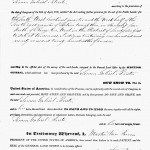Today marks a significant event in the life of Servant of God, Simon Brute. On March 7, 1835, Simon Brute officially became a citizen of the United States. This is significant in that Brute arrived in the United States nearly 25 years earlier. Writing in his 2005 dissertation, Fr. Albert Ledoux, said:
“Brute formally embraced United States nationality almost a quarter century after first stepping foot onto a Baltimore pier. He appeared in Vincennes’ Knox County Circuit Court, 7 March 1835 and forevermore renounced ‘all allegiance and fidelity to any foreign prince, potentate, state, or sovereignty whatsoever, but particularly to Louis Philip, King of France.’ Whatever antipathy he may have still felt toward the Orleanist monarch who had deposed the elder branch of his beloved Bourbons, Brute was far more likely motivated by considerations of United States civil law that in many states impeded a non-citizen’s right to hold substantial amounts of property. In fact, within two years, when worrying about the identity of his potential successor as bishop of Vincennes, one of Brutés chief concerns lay in the fact that none of his principal candidates had been naturalized or had even made the first attempt at doing so.” 1
In other words, the whole idea of non-citizen’s rights, or lack of rights, when it came to property was perhaps the primary reason for Brutés citizenship.
A search of Land records shows that within two years of his citizenship, Brute had begun purchasing land in Knox, Daviess and Perry County. Some of the records are available from the Bureau of Land Management or through Ancestry.com. These purchases were made in accordance with the 1820 act of Congress allowing for the sale of public lands. The Bureau of Land Management website allows you to look at a map for the location of the land. For example, there is a record for a purchase of land near Leopold Indiana, in Perry County. That tract is obvious in that Leopold was founded by Fr. August Bessonies. The records on the site show six land purchases in the three counties mentioned above.- Fr. Albert Ledoux, “The Life and Thought of Simon Brute Seminary Professor and Frontier Bishop” (PhD dissertation, Catholic University of America, 2005), 392.[↩]
